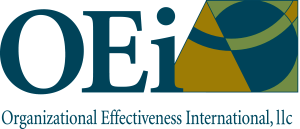The role of the HR professional is not what it used to be. Over the past 15 years, factors such as technology and outsourcing have enabled HR functions to finally do what we’ve always wanted – streamline the function’s administrative tasks so as to spend a greater percentage of time on more strategic and impactful work.
As a result, many HR departments are shifting to a Business Partner model, wherein HR Business Partners (formerly HR Generalists) are expected to really understand the business we support, to contribute strategic perspective, and to know and apply best practices in talent management, change management and culture/engagement, among many other things.
As an HR and OD leader and consultant for over 20 years, OEi’s founder, Joanna Groom King, recognized these changes early and has made it a mission to support HR professionals in developing newly required skills and knowledge, and to build the credibility and influence they need to have real and meaningful impact in their organizations. From this work was born OEi’s “High-Impact HR Business Partners: The Essential Toolkit” program. This program, which was updated and expanded in 2017 to incorporate the latest in the evolving environment and demands of the Human Resources function, equips HR professionals with practical strategies and tools for increasing their effectiveness.
“…. an oxygen mask will deploy above you. Please be sure to secure your own mask before assisting others.”
HR professionals must first attend to their own development, so they may effectively assist others.
⇓ Use arrows below to see all pages
High-Impact HR Business Partner Programs
⇑ Use arrows at top of page to see next/previous page
Becoming a High-Impact HR Business Partner:
- Understand the evolving expectations of HR professionals, and the opportunities and challenges this evolution presents
- Know the core competencies associated with being a strategic HR Business Partner (HRBP), and how these differ from the HR Generalist role
- Recognize their own strengths and development needs related to operating as a strategic business partner
- Learn strategies and approaches for developing needed skills
- Build (internal) customer acceptance of HR’s new role
- Make the mental shift required to successfully operate as a true partner to the business
- Have confidence and enthusiasm about becoming a high-impact HRBP
Strategically Managing Organizational Talent:
- Understand what Strategic Talent Management (STM) is and how it relates to organizational success
- Align talent management processes so as to support their organization’s culture and engagement objectives
- Operate as a contributing partner in the organization’s strategic planning process by translating strategic and business plans into talent/workforce requirement projections
- Conduct organizational talent gap assessments as a component of strategic workforce planning
- Be familiar with best practices related to key aspects of talent management, including:
- Attracting and on-boarding talent
- Managing and developing talent
- Retaining talent
Optimizing Culture and Engagement:
- Discern the difference between employee engagement and job satisfaction
- Understand how employee engagement impacts business results
- Know the drivers of employee engagement
- Recognize how culture and engagement are related
- Know what organizational culture is, and its impact on business success
- Identify cultural objectives that fit their organization
- Understand key factors for developing and “hard-wiring” organizational culture
- Know how to measure and optimize their organization’s culture and engagement
Coaching Organizational Leaders:
- Recognize the various types of coaching, and prerequisites for successful coaching
- Understand the unique characteristics and challenges of “covert coaching”, and strategies for meeting those challenges
- Know the competencies required to be an effective coach
- Recognize their unique coaching capabilities and limitations
- Understand Emotional Intelligence, and its applicability to them as a coach
- Utilize best practice coaching models, tools and techniques
Managing Organizational Change:
- Understand and convey the necessity and value of effective change management
- Be familiar with the differing types of organizational change and the common impacts of each
- Know the critical success factors of, and the process for, managing change
- Conduct a stakeholder analysis
- Understand the change-reaction cycle, and Resistance Management planning
- Develop a Communications Plan that builds buy-in (not just informs)
- Recognize and successfully address barriers to change
- Effectively monitor progress and ensure the sustainability of change initiatives
Becoming an Effective Internal Consultant:
- Understand the various modes of internal consulting
- Know the challenges of operating as an internal consultant, and strategies for meeting those challenges
- Recognize their unique consulting capabilities, characteristics and limitations
- Understand and master the standard process and primary steps of internal consulting
- Employ methods for ensuring aligned expectations when consulting to internal customers
- Effectively sell their ideas/solutions to others
Facilitating Excellent Meetings:
- Understand and embrace the unique role of the meeting facilitator
- Know and effectively manage the various stages and the key elements of a meeting
- Employ task management tools that keep meetings organized and on track
- Master strategies and techniques for effectively advancing critical group processes, including:
- Defining problems
- Brainstorming
- Evaluating solution options
- Making decisions
- Recognize and manage challenging group dynamics and participant behaviors
- Have confidence in their facilitation abilities

